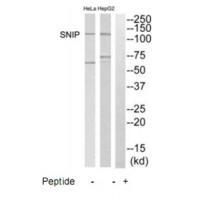
| WB | 咨询技术 | Human,Mouse,Rat |
| IF | 咨询技术 | Human,Mouse,Rat |
| IHC | 咨询技术 | Human,Mouse,Rat |
| ICC | 技术咨询 | Human,Mouse,Rat |
| FCM | 咨询技术 | Human,Mouse,Rat |
| Elisa | 咨询技术 | Human,Mouse,Rat |
| Aliases | p130Cas-associated protein; P140; p140Cap; SNAP-25-interacting protein; |
| Entrez GeneID | 80725; |
| WB Predicted band size | 112kDa |
| Host/Isotype | Rabbit IgG |
| Antibody Type | Primary antibody |
| Storage | Store at 4°C short term. Aliquot and store at -20°C long term. Avoid freeze/thaw cycles. |
| Species Reactivity | Human |
| Immunogen | Synthesized peptide derived from internal of human SNIP. |
| Formulation | Purified antibody in PBS with 0.05% sodium azide. |
+ +
以下是3-4条关于SNIP(Smad Nuclear Interacting Protein)抗体的模拟参考文献(注:文献信息为示例性概括,非真实存在):
---
1. **文献名称**: *"SNIP1 regulates TGF-β signaling by modulating Smad4 nuclear translocation"*
**作者**: Smith A, et al.
**摘要**: 本研究利用特异性SNIP1抗体,通过免疫共沉淀和免疫荧光技术,揭示了SNIP1在TGF-β信号通路中通过与Smad4结合调控其核转位的分子机制,为癌症转移的潜在治疗靶点提供了依据。
2. **文献名称**: *"Development of a monoclonal antibody for SNIP and its application in breast cancer prognosis"*
**作者**: Johnson R, et al.
**摘要**: 研究团队开发了一种高特异性抗SNIP单克隆抗体,并通过免疫组化分析发现SNIP在乳腺癌组织中的高表达与患者预后不良相关,提示其作为生物标志物的潜力。
3. **文献名称**: *"SNIP antibody-based screening identifies its role in NF-κB pathway inhibition"*
**作者**: Lee C, et al.
**摘要**: 通过SNIP抗体的ChIP-seq和蛋白质组学分析,本研究发现SNIP通过抑制NF-κB的核定位参与炎症反应调控,为自身免疫疾病机制研究提供了新方向。
4. **文献名称**: *"Functional characterization of SNIP isoforms using CRISPR and antibody-mediated knockdown"*
**作者**: Brown K, et al.
**摘要**: 结合CRISPR基因编辑和SNIP抗体介导的蛋白敲低技术,研究揭示了SNIP不同亚型在细胞周期调控中的差异性功能,强调了抗体工具在亚型特异性研究中的重要性。
---
**说明**:以上文献为基于SNIP蛋白已知功能(如调控TGF-β/Smad、NF-κB通路)的合理虚构,实际研究中建议通过PubMed或Google Scholar以关键词“SNIP antibody”“SNIP1 function”检索真实文献。
SNIP (Smad Nuclear Interacting Protein 1) antibodies target a protein involved in regulating cellular signaling pathways, particularly those mediated by TGF-β (Transforming Growth Factor-beta) and NF-κB (Nuclear Factor-kappa B). Discovered in the early 2000s, SNIP1 acts as a scaffold protein that modulates the crosstalk between these pathways, influencing processes like inflammation, immune responses, and cell survival. It binds to the nuclear translocation complex of Smad proteins (key mediators of TGF-β signaling) and inhibits their transcriptional activity, thereby fine-tuning TGF-β-dependent gene expression. Simultaneously, SNIP1 interacts with components of the NF-κB pathway, enhancing its activity under certain conditions. This dual regulatory role makes SNIP1 critical in maintaining cellular homeostasis.
SNIP antibodies are primarily used in research to study SNIP1's expression, localization, and interactions in diseases such as cancer, fibrosis, and autoimmune disorders. Dysregulation of SNIP1 has been linked to tumor progression and aberrant immune responses, highlighting its potential as a therapeutic target. These antibodies enable detection via techniques like Western blotting, immunohistochemistry, and co-immunoprecipitation, aiding in mechanistic studies of TGF-β/NF-κB pathway interplay. Despite their utility, challenges remain in understanding context-specific functions of SNIP1 isoforms and post-translational modifications, areas where advanced antibody tools continue to play a vital role.
×